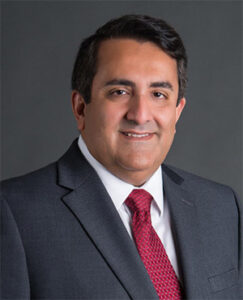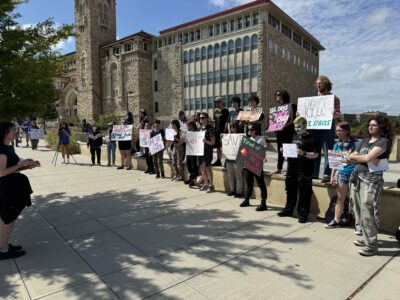KU recommending elimination of pair of graduate degrees in film, religious studies; Regents mandating review of programs
Enrollment challenges also have host of liberal arts degrees up for review

photo by: University of Kansas
The skyline of the University of Kansas is pictured.
A pair of graduate degrees — a doctorate in film and a master’s in religious studies — are on the verge of being eliminated at KU, while multiple liberal arts degrees are set to get increased scrutiny.
University of Kansas leaders will propose to the Kansas Board of Regents this week that KU begin the process of eliminating its PhD in Film & Media Studies and its masters degree in Religious Studies. The university also is recommending that five degree programs be put on a watch list for possible elimination in future years. Those programs include graduate degrees in the departments of African & African American Studies, Classics, East Asian Languages & Cultures, Film & Media Studies, and Education and Social Policy.
The Regents are in the second year of a system that is placing more pressure on state universities to review whether particular degree programs should continue. Last year, KU placed 11 degree programs on a list requiring that they take actions to improve their enrollment numbers and other metrics, but KU did not eliminate any degrees as part of that initial review.
This year, a committee appointed by KU Provost Barbara Bichelmeyer determined that the film and religious studies degrees had enrollment or graduation levels that made it infeasible to continue offering the degrees for the long term. In a memo to Regents, KU characterizes the pending elimination of the degree programs as a “phase out,” suggesting that the programs will stop accepting new students but will continue to serve existing students on track to receive a degree.
The decision to eliminate the doctorate in film and media studies is driven, in part, by changes to the department’s faculty, KU leaders said in a memo to Regents.
“After multiple faculty departures and three new hires, the current expertise of the faculty centers largely on film and media production, as opposed to a ‘studies’ focus,” KU leaders wrote in the memo. “Accordingly, the department’s faculty have recently voted to discontinue the PhD and reorient the program toward production.”
The doctorate program, though, also has been facing enrollment challenges. The Regents have set a recommended minimum of at least five full time students for doctorate programs, which the film program narrowly met with 6.25 students. However, the doctorate program wasn’t meeting the recommended minimum of at least two graduates per year, KU leaders said in the memo.
Enrollment challenges also played a role in the recommendation to eliminate the master’s in Religious Studies degree. That degree program didn’t meet either of the recommended enrollment minimums for a master’s degree — at least 12 students and five graduates per year — according to data from KU.
Low enrollment totals also were the primary reason that the master’s program in African & African American Studies is one of five programs recommended to complete an “action plan,” which puts the department on notice that it needs to make improvements over the next three to four years to ensure its status as an offered degree at the university.
KU leaders said the African American studies program saw enrollment declines during the Covid pandemic, but had started to see a rebound in numbers. The program has 7 students — which is below the recommended minimum of 12 students — and also is not meeting the metric of at least five graduates per year. KU is recommending the program continue so that it has time to implement a couple of initiatives that leaders hope will further boost enrollment. One initiative is the development of an accelerated program that allows students receive an undergraduate and master’s degree within five years. Also under consideration is the development of an online master’s program that targets high school teachers seeking a degree in African American studies. Such an online program would be one of the few in the country, and the only one offered in the Big 12 Conference, KU leaders said in the memo.
Other programs that are recommended for action plans are:
• Master’s in Classics. The program is meeting the Regent’s recommendation of at least five graduates per year, but needs to increase overall enrollment numbers, according to the memo. Among the strategies under consideration is increased scholarship offerings, and lowering the amount of advanced Greek and Latin classes needed for admission.
• Master’s in East Asian Languages and Cultures. The program currently isn’t meeting either the enrollment or graduation metrics. Strategies under consideration include more targeted recruitment of foreign language majors and an accelerated master’s program.
• Master’s in Film and Media Studies. While the doctorate program would be eliminated, the university wants to maintain the master’s program but reorganize it to have an increased emphasis on film and media production.
• Master’s in Education and Social Policy. The program has 11 students, and also isn’t meeting the recommendation of at least five graduates per year, according to data submitted to the Regents. KU leaders, though, argue the program is “right-sized and fills an important need for research and policy-focused graduate education.” In the memo to Regents, KU said it is reviewing whether the degree program could merge with one of the other master’s programs offered by KU’s education school. A decision on a merger is expected by the end of the Spring 2026 semester, Regents were told.
On that front, KU is recommending the merger of two programs in the engineering and sciences fields for the next school year. KU is proposing that its doctorate in Environmental & Water Resources Science be merged into the doctorate program for Environmental & Water Resources Engineering. KU also is proposing a similar merger of the master’s programs for the two degrees.
Regents will consider the various degree recommendations at their meeting on Wednesday in Topeka. The process of eliminating the film and religious studies degrees, however, won’t be finalized on Wednesday. KU leaders said in the memo that they will submit the recommendations for elimination to KU’s faculty governance committees in the Fall 2025 semester.







